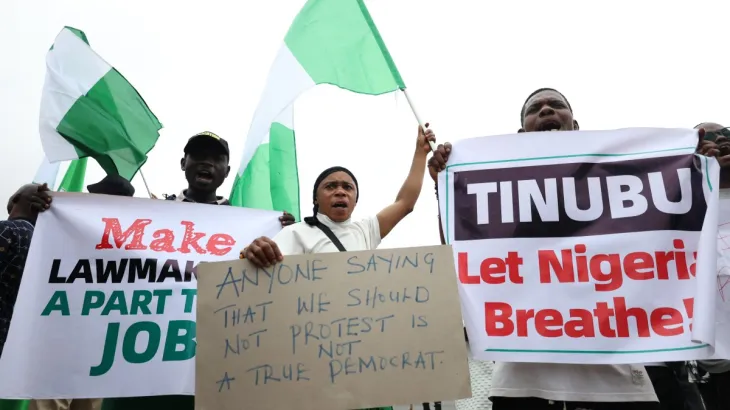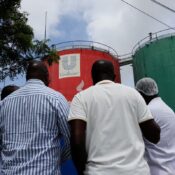
In Nigeria, protests against the high cost of living resulted in at least three deaths
On Thursday, when protestors staged demonstrations across the West African nation against issues related to governance and the rising cost of living, at least three protesters were killed in Nigeria’s Kaduna state, according to Reuters reporters and eyewitnesses.
Mansur Hassan, a spokesman for the Kaduna State Police, confirmed that tear gas, not live bullets, was shot at the demonstrators. Additionally, eyewitnesses claim that police used tear gas to disperse protesting masses in Abuja, the country’s capital.
Protesters voiced their dissatisfaction with economic policies that have resulted in widespread inflation and increased hardship for average Nigerians by holding demonstrations in Abuja, Lagos, the commercial hub, and several other cities.
Bola Tinubu, the president, has promised to pursue the reforms he believes are necessary to keep the nation afloat.
Armed security guards were sent in by the authorities to quell any possible bloodshed.
As demonstrators in Lagos advanced on the government house and on to two sites designated for the rally, armed police stood by. The city’s retail centers were closed and heavily manned by police.
Nigerians are organizing online to demand, among other things, the restoration of fuel and electricity subsidies, free primary and secondary education, and steps to combat insecurity. These demands are motivated by the June protests in Kenya, which forced the government there to axe some planned tax increases.
The military erected barricades on the highway that led into Abuja, and some demonstrators assembled in a stadium.
Despite a strong security presence, young people protested in Maiduguri, the epicenter of a militant insurgency in the northeast of the nation, to express their dissatisfaction with the government and its policies.
TINUBU REFORMS
Prior to the demonstrations, the authorities declared that talks were welcome.
Although citizens are complaining that lawmakers are not making enough sacrifices themselves, Tinubu has encouraged them to put up with his reforms.
Following his removal of some fuel subsidies, devaluation of the naira, and later raise in energy tariffs, Tinubu took office more than a year ago. These actions caused inflation to rocket over 34% and erode incomes.
In June, annual consumer inflation reached a record 28-year high of 34.19%.
Nigerians also have to deal with a generalized lack of security, which has hurt the agricultural industry, and in the north, armed groups kidnap locals and schoolchildren in exchange for ransom.
Previous protests were led by labor unions. However, the majority of the youth marchers on Thursday were unemployed, adding a new dimension to the government’s attempt to mitigate the effects of its economic policies.
To assist workers in adjusting to the adverse effects of his economic reforms, Tinubu signed a new minimum wage into law on Monday. However, a large portion of the 200 million people in the nation are either unemployed or self-employed.
All Categories
Recent Posts
Tags
+13162306000
zoneyetu@yahoo.com


